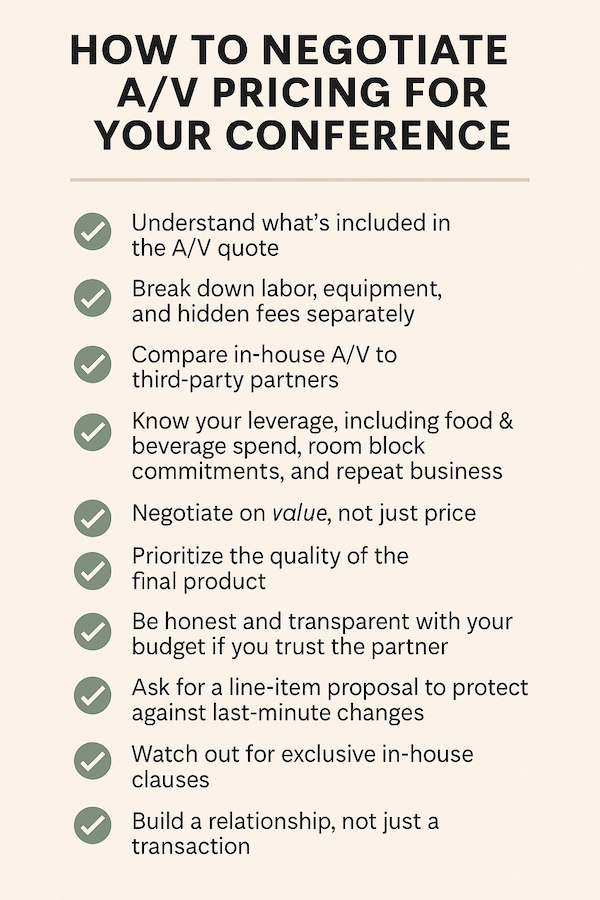Over the past 12 years working in event production, I’ve had the chance to partner with hundreds of event planners across corporate conferences, brand activations, and high-end social events. In my current role as Director of Sales and Marketing at a leading A/V production company, I’ve seen firsthand what separates good planners from truly exceptional ones — and earning an event planning certification absolutely plays a part in that.
Even though I’m not a certified event planner myself, I’m currently working through my Certified Meeting Professional (CMP) credential because I know how valuable it is for anyone in the corporate events world. The knowledge, professionalism, and proactive mindset that come with these event planning certifications make a world of difference, not just for planners but for the entire vendor team.
If you’re part of a corporate event planning team or an experienced planner wanting to level up, here are the top event planner certifications I strongly recommend considering.
Why Event Planning Certifications Matter
When I see a planner walk in with a CMP, CSEP, or Certified Event Designer credential, I know they’re going to run a solid event. Certified planners consistently:
- Communicate clearly and thoroughly
- Provide detailed timelines, load-in/load-out plans, and run-of-show documents
- Ask the right questions on A/V RFPs, which means we can quote them more accurately and cost-effectively
- Stay proactive, delivering key details before we even have to ask
That level of organization helps my team focus on delivering flawless production, rather than putting out fires. It’s not an exaggeration to say that event planning certifications make the entire process smoother — for vendors, sponsors, and especially attendees.
My Top Recommended Event Planning Certifications
1. CMP (Certified Meeting Professional)
In my experience, the CMP certification sets the bar for corporate and high-level event planners. CMPs understand meeting strategy, risk management, and production workflows inside and out. When I collaborate with a CMP, I know I’ll receive a thorough run-of-show, precise schedules, and a clear, proactive communication style. That means no surprises on site — and less stress for everyone.
The CMP is administered by the Events Industry Council, and it’s widely considered the gold standard for corporate event planning professionals.
2. CSEP (Certified Special Events Professional)
If your work leans more toward creative events and social celebrations, the CSEP certification can be a powerful credential. I’ve seen CSEPs bring incredible creative vision while still maintaining a high level of professionalism and structure. They tend to excel in budgeting, vendor coordination, and creative event design, which is critical when managing big entertainment-driven or social gatherings.
The CSEP is offered by the International Live Events Association (ILEA) and is well respected across the special event planning industry.
3. Certified Event Designer
Event design is an emerging focus in corporate and high-end social events, with organizations expecting unique, memorable experiences rather than cookie-cutter programs. The Certified Event Designer program gives planners a structured framework for designing events strategically and creatively.
I’ve noticed that planners with this credential approach production differently — they’re thinking about the emotional journey, branding, audience behavior, and messaging. That means stronger collaboration with production teams like mine to bring bold ideas to life in a realistic, executable way.
This event planning course is administered by the Event Design Collective.
A Real-World Example
One year, we produced a large-scale conference for a regional beverage brand. It was their first time hosting an event at this scale, and they didn’t have a certified planner on the project. There were countless communication hiccups and timeline challenges, though thankfully our Centric team was experienced enough to catch potential gaps early and ask the questions they didn’t even know to ask — even outside our scope — to make sure the event succeeded.
The following year, we proposed including a CMP as part of the event budget, and they jumped on the idea. The difference was night and day. The next event ran smoothly, with clear plans, strong communication, and no surprises. That client has never gone back to planning large events without a certified event planner, and neither would I if I were in their shoes.
A Word of Caution
Event planning certifications absolutely raise the standard, but they aren’t a shortcut to real-world experience. I’ve seen planners with certifications who still had to build up their on-the-ground skills before they could handle high-pressure events smoothly. The strongest planners I work with combine formal credentials and years of practical, hands-on experience. That combination is unbeatable.
Final Thoughts
If you’re serious about corporate event planning — or you’re running a corporate event team — investing in event planner courses and certifications is one of the smartest moves you can make. From my vantage point on the A/V production side, certified planners help every vendor do their job better, which translates to a world-class event for your attendees.
Event Planning Certification Resources
Here’s a quick list of the event planning certifications I mentioned, with links to help you get started:
- CMP (Certified Meeting Professional)
Events Industry Council – CMP - CSEP (Certified Special Events Professional)
ILEA – CSEP - Certified Event Designer
Event Design Collective
If you’re exploring event planning classes or online event planner courses, these programs are a solid place to start.

